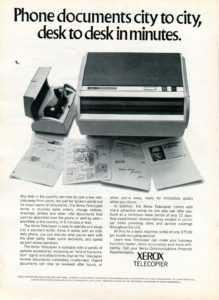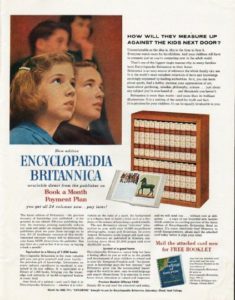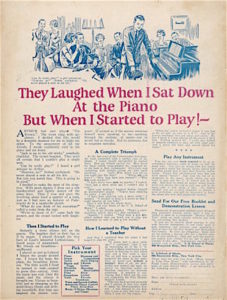 One noteworthy aspect of growing older is that you find yourself benignly bemused—if you’re lucky—by the constant parade of new technologies that worm their way into your everyday life almost before you know it, pushing other, once-innovative things out of your life as they do so.
One noteworthy aspect of growing older is that you find yourself benignly bemused—if you’re lucky—by the constant parade of new technologies that worm their way into your everyday life almost before you know it, pushing other, once-innovative things out of your life as they do so.
In 2005, for instance, I posted a list of “things I no longer use, do, or see.” It included toothpaste in tubes, ketchup in glass bottles, newspapers and magazines on paper, fax machines, going to the post office to mail packages, black discs and cassettes, TV commercials, typewriters, stationery, going to the library, electric can openers, floppy disks, “water-cooler” TV shows, the evening news, dinner parties, and renting videos.
In 2008 I posted another list, this one of “inventions I first encountered when young that are now taken for granted.” It included direct long-distance dialing, fast food, electric car windows, color television, automobile tape decks, digital clocks, photocopiers, and personal calculators.
In 2013 I posted a second list of things that I no longer do. It included mailing personal letters, writing checks, ordering anything by mail or phone, shopping at record stores or brick-and-mortar bookstores, making popcorn in a skillet or heating soup on a stove, listening to terrestrial radio (other than when driving in a car), sitting down in front of the TV every night to find out whether it’s going to rain tomorrow, adjusting the antenna to make the picture come in more clearly, doing business with bank tellers, using bottle openers, using phone books, using dictionaries or encyclopedias, using pay phones, using a landline, owning a camera, and wearing a watch.
 Two of the items on these lists, as it happens, no longer belong there. I wrote in 2005 that The Sopranos was “the last TV series to be viewed on a regular basis by more than a handful of my friends.” Needless to say, that is now far from true, though the notion of a TV series that “everybody” watches has been altered beyond recognition since the days of All in the Family and M*A*S*H. I ran across a tweet the other day week that offered a vivid statistical illustration of how completely American culture has been transformed by information technology: “My Mother the Car, an epic bomb about a woman reincarnated as an automobile, had an audience larger than any TV show running today.” Take that, Game of Thrones!
Two of the items on these lists, as it happens, no longer belong there. I wrote in 2005 that The Sopranos was “the last TV series to be viewed on a regular basis by more than a handful of my friends.” Needless to say, that is now far from true, though the notion of a TV series that “everybody” watches has been altered beyond recognition since the days of All in the Family and M*A*S*H. I ran across a tweet the other day week that offered a vivid statistical illustration of how completely American culture has been transformed by information technology: “My Mother the Car, an epic bomb about a woman reincarnated as an automobile, had an audience larger than any TV show running today.” Take that, Game of Thrones!
As for not using a landline, Mrs. T and I do have one at our place in rural Connecticut. We have no choice, though, for the woodsy hollow in which we live is inaccessible via cellphone. Were it otherwise, we’d almost certainly give up the landline, as I did in New York a decade and a half ago.
All of the remaining items on my three chronicles of obsolescence have remained obsolete, however, and still more long-ubiquitous practices have since joined them in the memory hole of postmodern technology. Here are some that come to mind:
• Eating meals at the dinner table. My family always ate dinner together at the kitchen table, and my mother continued to feed my brother and me there to the end of her life. Mrs. T and I, by contrast, have dinner tables in New York and Connecticut, but we scarcely ever use them save on holidays. Not counting restaurant meals, I can’t remember the last time the two of us ate dinner at a table.
• Not knowing the exact time. We longer have wall clocks in either of our apartments, and I’ve never worn a watch for more than a month or so at a stretch (I lose them). If I want to know the time, I look at my MacBook screen, the TV, or my cellphone, all of which are automatically synchronized to whatever electronic time signal keeps cyberspace in temporal lockstep. I do still have an analogue alarm clock on the windowsill of my New York office-bedroom, but it stopped working a couple of years ago, and I’ve never bothered to fix or replace it. Instead, I use my cellphone whenever I need to get up at a specific time. The only reason why I haven’t chucked my old alarm clock is that I like its clean-lined midcentury-modern design.
• Going to the movies. I saw five movies in a theater last year, Dunkirk, Fences, Lady Bird, Manchester by the Sea, and Three Billboards Outside Ebbing, Missouri. (I would have seen The Big Sick there had Mrs. T not been ill when it was showing in Connecticut.) What’s more, that was an unusually large number for me: there are years when I never set foot in a multiplex. Time was when I went to at least one or two movies a month, but information technology and the vertiginous decline of the adult-friendly film have joined forces to keep me on the couch.
• Making and taking phone calls. I call Mrs. T nightly whenever we’re in different cities, and I call Our Girl in Chicago at least once a month. Otherwise, I never make personal calls just to chat.
 • Playing a musical instrument. When I was a boy, it was not merely commonplace but customary for children of both sexes to learn how to play an instrument, whether in school or from a private teacher, and self-taught guitarists and drummers were as common as autumn leaves. No more. Not only are public-school instrumental music programs drying up, but according to this report,
• Playing a musical instrument. When I was a boy, it was not merely commonplace but customary for children of both sexes to learn how to play an instrument, whether in school or from a private teacher, and self-taught guitarists and drummers were as common as autumn leaves. No more. Not only are public-school instrumental music programs drying up, but according to this report,
[e]lectric guitar makers are seeing their sales steadily plummet. Leading guitar companies Fender and Gibson are both in debt; Fender was forced to abandon a public offering in 2012, and Gibson’s annual revenue fell from $2.1 billion to $1.7 billion over just the last three years. Guitar Center, the largest chain of its kind, is $1.6 billion in the red.
• Getting excited about space travel. I was a space junkie as a boy—one of our most memorable family vacation events was a tour of Cape Canaveral—but like most of my fellow Americans, I lost interest in the space program after Apollo 11 landed on the moon, so much so that I have no clear memories of the events chronicled in Ron Howard’s Apollo 13, which took place less than a year later. The only reason why I saw the Challenger blow up is that I happened to be standing next to a woman whose husband was then in the running to fly on a subsequent shuttle flight. (Yes, he pulled out.)
• Making mixtapes. Not only did I make hundreds of them, but I burned stuff-you’ll-like CDs for any number of friends after the cassette became obsolete. Now I don’t even own a burner, much less a cassette deck.
Here’s the surprising part: I miss a few of these things very much, but the rest mean little or nothing to me. You’d think that a person who, like me, is wont to heed the siren call of nostalgia would care more about the passing of, say, the Yellow Pages. But I don’t: I’m mostly content to accept things as they are, adrift as I am on the sea of liquid modernity. Maybe that’s wise, maybe it’s cowardly, but either way, you won’t catch me going out of my way to buy bottled ketchup or writing five-page letters with a fountain pen. Not only am I too lazy, but my left-handed scrawl is barely legible. Don’t get me wrong: I have very little love for the postmodern world into which I’ve survived. I’m more interested in understanding it than in trying to change it, though, which is surely a function of advancing age, something that typically tows in its wake a resignation that may or may not be the same thing as wisdom.
Justice Holmes said it: “An old man ought to be sad. I don’t know whether I shall be when the wind is west and the sky clear.” Nor do I.
* * *
A scene from “I’m With the Band,” an episode of Freaks and Geeks directed by Judd Apatow and written by Gabe Sachs and Jeff Judah. This episode was originally telecast by NBC on November 13, 1999:
A scene from the 2000 film version of High Fidelity, directed by Stephen Frears and written by D.V. DeVincentis, Steve Pink, John Cusack, and Scott Rosenberg:
